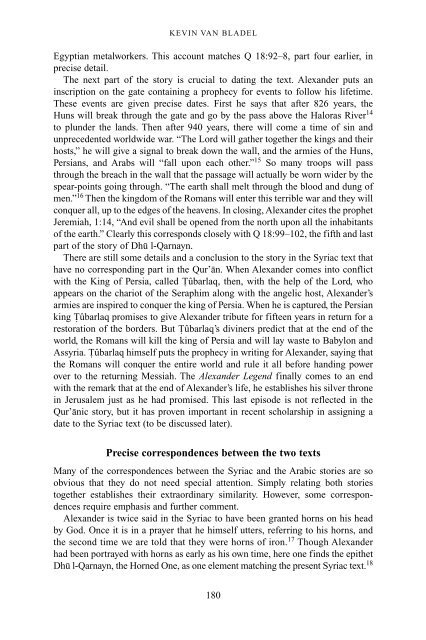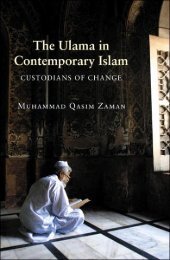The Qur'an in its historical context (pdf - Islam and Christian-Muslim ...
The Qur'an in its historical context (pdf - Islam and Christian-Muslim ...
The Qur'an in its historical context (pdf - Islam and Christian-Muslim ...
Create successful ePaper yourself
Turn your PDF publications into a flip-book with our unique Google optimized e-Paper software.
KEVIN VAN BLADEL<br />
Egyptian metalworkers. This account matches Q 18:92–8, part four earlier, <strong>in</strong><br />
precise detail.<br />
<strong>The</strong> next part of the story is crucial to dat<strong>in</strong>g the text. Alex<strong>and</strong>er puts an<br />
<strong>in</strong>scription on the gate conta<strong>in</strong><strong>in</strong>g a prophecy for events to follow his lifetime.<br />
<strong>The</strong>se events are given precise dates. First he says that after 826 years, the<br />
Huns will break through the gate <strong>and</strong> go by the pass above the Haloras River 14<br />
to plunder the l<strong>and</strong>s. <strong>The</strong>n after 940 years, there will come a time of s<strong>in</strong> <strong>and</strong><br />
unprecedented worldwide war. “<strong>The</strong> Lord will gather together the k<strong>in</strong>gs <strong>and</strong> their<br />
hosts,” he will give a signal to break down the wall, <strong>and</strong> the armies of the Huns,<br />
Persians, <strong>and</strong> Arabs will “fall upon each other.” 15 So many troops will pass<br />
through the breach <strong>in</strong> the wall that the passage will actually be worn wider by the<br />
spear-po<strong>in</strong>ts go<strong>in</strong>g through. “<strong>The</strong> earth shall melt through the blood <strong>and</strong> dung of<br />
men.” 16 <strong>The</strong>n the k<strong>in</strong>gdom of the Romans will enter this terrible war <strong>and</strong> they will<br />
conquer all, up to the edges of the heavens. In clos<strong>in</strong>g, Alex<strong>and</strong>er cites the prophet<br />
Jeremiah, 1:14, “And evil shall be opened from the north upon all the <strong>in</strong>habitants<br />
of the earth.” Clearly this corresponds closely with Q 18:99–102, the fifth <strong>and</strong> last<br />
part of the story of Dhu l-Qarnayn.<br />
<strong>The</strong>re are still some details <strong>and</strong> a conclusion to the story <strong>in</strong> the Syriac text that<br />
have no correspond<strong>in</strong>g part <strong>in</strong> the Qur’an. When Alex<strong>and</strong>er comes <strong>in</strong>to conflict<br />
with the K<strong>in</strong>g of Persia, called Tûbarlaq, then, with the help of the Lord, who<br />
appears on the chariot of the Seraphim along with the angelic host, Alex<strong>and</strong>er’s<br />
armies are <strong>in</strong>spired to conquer the k<strong>in</strong>g of Persia. When he is captured, the Persian<br />
k<strong>in</strong>g Tûbarlaq promises to give Alex<strong>and</strong>er tribute for fifteen years <strong>in</strong> return for a<br />
restoration of the borders. But Tûbarlaq’s div<strong>in</strong>ers predict that at the end of the<br />
world, the Romans will kill the k<strong>in</strong>g of Persia <strong>and</strong> will lay waste to Babylon <strong>and</strong><br />
Assyria. Tûbarlaq himself puts the prophecy <strong>in</strong> writ<strong>in</strong>g for Alex<strong>and</strong>er, say<strong>in</strong>g that<br />
the Romans will conquer the entire world <strong>and</strong> rule it all before h<strong>and</strong><strong>in</strong>g power<br />
over to the return<strong>in</strong>g Messiah. <strong>The</strong> Alex<strong>and</strong>er Legend f<strong>in</strong>ally comes to an end<br />
with the remark that at the end of Alex<strong>and</strong>er’s life, he establishes his silver throne<br />
<strong>in</strong> Jerusalem just as he had promised. This last episode is not reflected <strong>in</strong> the<br />
Qur’anic story, but it has proven important <strong>in</strong> recent scholarship <strong>in</strong> assign<strong>in</strong>g a<br />
date to the Syriac text (to be discussed later).<br />
Precise correspondences between the two texts<br />
Many of the correspondences between the Syriac <strong>and</strong> the Arabic stories are so<br />
obvious that they do not need special attention. Simply relat<strong>in</strong>g both stories<br />
together establishes their extraord<strong>in</strong>ary similarity. However, some correspondences<br />
require emphasis <strong>and</strong> further comment.<br />
Alex<strong>and</strong>er is twice said <strong>in</strong> the Syriac to have been granted horns on his head<br />
by God. Once it is <strong>in</strong> a prayer that he himself utters, referr<strong>in</strong>g to his horns, <strong>and</strong><br />
the second time we are told that they were horns of iron. 17 Though Alex<strong>and</strong>er<br />
had been portrayed with horns as early as his own time, here one f<strong>in</strong>ds the epithet<br />
Dhu l-Qarnayn, the Horned One, as one element match<strong>in</strong>g the present Syriac text. 18<br />
180



